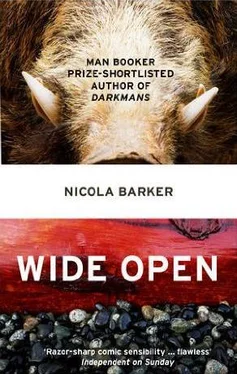Each day Ronny saw the same man waving. The man stood in the middle of a bridge, at its very centre point, but always looking outwards, facing away from London, never towards it. Ronny drove under that bridge in a borrowed car, a Volvo (the big bumpers reassured him), and into London along the A2 for three consecutive weeks. Every day, no matter what the time — he was working shifts, and by no means regular ones — the man stood on the bridge, waving.
He didn’t wave randomly. He picked out a car as a smudge on the horizon and then focused on that car alone, until it had passed from sight, until it had driven right under him. Until it had gone. Then he’d choose another car and the whole process would start over.
Ronny noticed that the man preferred white cars and yellow cars, that he never waved at red cars. Ronny’s car was green. He was waved at sometimes, but infrequently. He didn’t wave back.
Some days it rained. It was the tail end of summer. It was the beginning of winter. It was autumn, formally, but Ronny hated gradations. It wasn’t summer. Summer had gone. It wasn’t winter. Winter was frosty, traditionally, and it was nowhere near cold enough for frost yet. It was simply a wet time. The whole earth was sodden and weighted and clotted and terrible. It was raining. Always raining. But the man stood on the bridge and he waved, nonetheless.
On the last day, the final day of his three-week working stint, Ronny looked out for the man but saw that he was not waving. He was there, sure enough, but he was crouched over, hanging, it seemed, across the bar of the bridge. What was he thinking of? What was he doing? Ronny scowled and tried to keep his eyes on the road.
He didn’t want to stare, but his eyes kept shifting from the road to the bridge, from the road to the bridge. He indicated and then swung into the inside lane. He slowed down, inadvertently. A truck honked and jolted him out of his eye-high reverie.
He passed under the bridge and then out the other side. He checked his rear-view mirror. He couldn’t see anything. Why should he? He was on the wrong side now. He slowed down even further. Three cars overtook him. His foot touched the brake.
What was he doing? He didn’t want to stop but he found himself stopping. He pulled into the hard shoulder. He turned off the engine, unfastened his seatbelt, stepped out of the car, slammed the door shut behind him but didn’t pause to lock it. Instead he started off towards the bridge at a lively pace. His keys bumped and jangled against his thigh in his pocket.
He reached the embankment, drew breath for a moment and then began to climb. It was steep. The soil was damp. His shoes — white shoes — were muddied. He cursed.
Eventually he made it to the top. He clambered over the fence, crossed the road, and was finally able to see the waver up close. He felt an unexpected surge of gratification, as though this visual intimacy was something he’d longed for, only he hadn’t quite realized it.
At first glance the waver seemed fairly unexceptional. He had a beard and longish, tangled brown hair. He was pale. His clothes were shabby. He’d been crying.
Ronny drew closer. He stamped the mud off his shoes. “Is anything the matter?”
The man was bent double, was curled up like a dirty bandage, but he grew and grew like Jack’s beanstalk when Ronny spoke to him. He seemed to unfold, to unwind to his full height, which was considerable. Tall, Ronny thought, and thin. Ronny was thin too, but he felt much smaller.
“Is something wrong?”
The man was standing now, and Ronny saw that he had not in fact been squatting before but sitting, on a small battered-looking cardboard box. He had his left hand cupped, and in his curved palm he held something.
“What is that?”
The man answered, his voice nearly extinguished by the roar of the traffic below, “Come and see.”
Ronny drew closer still. He stared into the man’s hand. He inhaled sharply. The man’s fingers were shiny with scar tissue, but only on their tips, where they shone as smooth as wax, as pale as lard. Nestled in the centre of these strange fingers was a dirty palm. In the palm was a wasp.
“A wasp,” Ronny said softly. “What’s wrong with it?”
“It was in a puddle. I should have left it but I saw it was still moving so I picked it up. I believed I could save it.”
Ronny stared at the wasp more fixedly. It was still alive. It moved, but only slightly. It seemed to be arching itself, the dainty waist between its black thorax and striped abdomen virtually snapping in two.
“It’s been writhing,” the man said, his voice — Ronny felt — ridiculously emotional.
“It’s been in so much pain .”
Ronny adjusted the blue woollen hat he was wearing. He pulled it low over his eyebrows. He cleared his throat, cautiously. “I don’t think wasps feel pain,” he said, anticipating a strong reaction.
The man glanced up, clearly indignant, his eyes, Ronny noticed, a wild cess-pit green, his cheeks drawn and hollow. “How can you know that?”
“I don’t. I’m just guessing.”
“Well you’re wrong. Look properly for a second and then try and tell me that it feels nothing.”
Ronny tried his best to look properly. The wasp stirred, only slightly, but it seemed to be shuddering. Its movements were small yet jagged and loose and horrible.
“It’ll die in a minute,” Ronny muttered, vaguely disquieted, withdrawing again and wishing he could ask the man why it was that he waved, but he didn’t because he fancied — quite correctly — that his timing might be off-kilter. The man continued to focus on the wasp.
Ronny inspected his watch. It was getting late.
“I’ll be off then.”
The man was very quiet, seemed barely to breathe he was so intent on his vigil. Eventually he said, “I think he’s finally going.”
Ronny nodded and turned to leave. This was a private moment. He had no wish to intrude. He took several steps and then…
“My God !”
He spun around, his heart racing. “What?”
“The wasp!”
Ronny smiled weakly at his own faint-heartedness, but he stepped up again with no visible signs of resentment.
“See?”
The man showed Ronny his hand. Ronny looked. The wasp was still. It was dead.
“It’s dead.”
The man grunted, unimpressed. “I know it’s dead. But did you see the sting?”
“The sting?”
The man pointed. “When it died it curled up, incredibly tightly, and then the sting came shooting out from the back there, the whole sting was revealed in that final moment.”
Ronny felt absurd but he bent forward anyway. Sure enough, he saw the sting.
“I see it.”
“There’s a wonderful logic to it sliding out like that,” the man said, almost smiling. Ronny tilted his head. “What do you mean?”
“He’s at rest. He’s surrendered. He’s finally given up his weapon.”
Ronny considered this for a while and then said, “No. I don’t see it that way at all.”
The man looked up. “You don’t? So how do you see it?”
“Well…” Ronny scratched his neck. “He’s a warrior. His weapon is drawn even in death. Especially in death. That’s the whole point of a wasp. He’s the kamikaze pilot of the insect world.”
The man smiled at this, he stared at Ronny intently, at his neat edges, his apparent cleanliness, his bright, pale face. Eventually he said, “That’s very funny.”
Ronny rubbed his nose, modestly.
“But all the same…” the man continued, “it’s not actually true. Only bees die when they sting. Wasps work differently. They’re tougher. He’s given up his weapon. That’s plainly how it is.”
Читать дальше
Конец ознакомительного отрывка
Купить книгу












